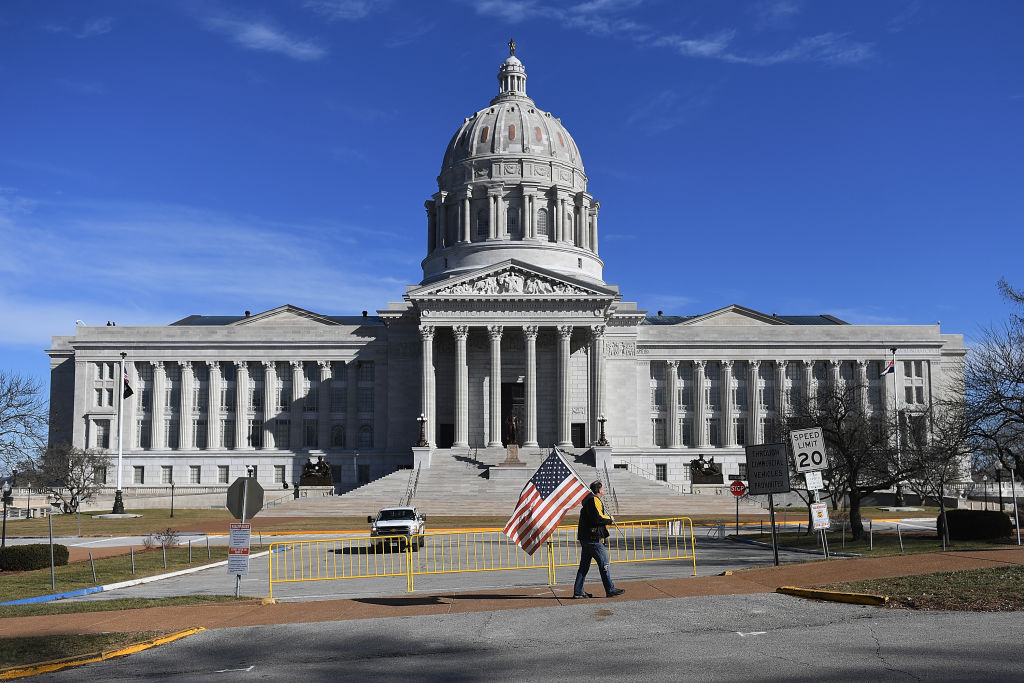A new bill introduced in the Missouri state legislature shows how far state governments are willing to go to dictate what private companies can and cannot say.
SB 1061 prevents private companies from bidding for and entering into government contracts if the company “is currently engaged in, and agrees for the duration of the contract not to engage in, any kind of economic boycott.”
According to the bill, economic boycott is defined as “refusing to deal with, terminating business activities with or otherwise taking any commercial action that is intended to penalize, inflict economic harm on, limit commercial relations with or change or limit the activities of a company because the company [engages with certain behaviour].”
The bill explicitly lays out a prohibition on companies seeking public contracts through the state of Missouri while also refusing to engage with entities that refuse to “facilitate access to abortion, sex or gender change, or transgender surgery or medical treatments.”
This means that companies choosing to say they do not support other companies or governments that encourage curtailing gender-affirming care will not have access to lucrative state government contracts.
According to Brian Hauss, senior staff attorney for the ACLU, the Supreme Court has already weighed in on the constitutionality of economic boycotts under the First Amendment, but recent court decisions have thrown doubt on the process.
“This country began from a boycott of British goods and boycotts have been a fundamental part of American political discourse ever since. Recently, however, a federal appeals court concluded that politically motivated consumer boycotts are not protected by the First Amendment, even though the Supreme Court unanimously recognized the right to boycott more than 40 years ago in NAACP v. Claiborne Hardware Co.,” Hauss says.
“Anti-boycott laws force citizens to censor their political beliefs. Boycotting is an act of protest that has always been protected by the First Amendment.”
The Missouri senate also introduced a similar bill to SB 1061, SB 980, which goes beyond economic boycotts to prevent companies from not doing business with other companies that do not have diversity, equity and inclusion (DEI) programs.
Economic boycott bills have become a cause from the American right in recent years, expanding from pushing back on companies that invested in environmental, social and corporate governance (ESG) initiatives to help combat climate change. Anti-ESG investing became a big rallying cry from the Republican party, with the Heritage Foundation even drafting model legislation against companies that attempted to not do business with other companies that did not consider ESG measures.
That model legislation left room for the insertion of “insert additional state-specific boycotting criteria,” which in the last two years have included preventing companies from avoiding doing business with other companies that pushed hardline anti-LGBTQ2S+ policies.
Missouri’s efforts are not the first to enact such a legislation this year, nor are they the only effort to attempt similar types of regulation, says Allison Chapman, an independent LGBTQ2S+ legislative researcher.
According to Chapman, 11 similar bills were introduced, one passed and four failed during the 2022 legislative session. This year, there have been four similar bills introduced around the country—and it is not even halfway through the first month of the legislative session. That means there is plenty of time for more bills to be introduced.
Ultimately, these bills seek to use the force of the state government to prevent companies from aligning ideologically with causes that the state does not want them to, by using the threat of government contracts—which for smaller companies can mean life and death, Chapman adds.
“These bills try to prevent large companies who rely on government contracts from working with companies who the right calls ‘woke,’” she says. Any company that has government contracts that decides to take action with their money, and refuse to work with other companies based on those companies being anti-abortion, anti-trans, anti-environment, or similar positions, will not be allowed to have a government contract.
“These bills are one of the ways Republicans are targeting what they call ‘wokeness.’ They are essentially trying to prevent companies from taking a stance on social issues and focus purely on profit,” she says.
It is also unclear if either SB 1061 or 980 will end up being enacted into law, as each was only introduced in the past month. However, Missouri’s attorney general has been active in speaking out against DEI initiatives as well as pushing emergency regulations on trying to halt the practice of gender-affirming care in his state.
These bills will now go through the committee process, where it will become clearer if they have a chance to pass.
Whether or not these bills will embolden companies to take harder anti-trans and anti-LGBTQ2S+ stances is an open question. However, Chapman says she believes these bills are more likely to be successful in preventing companies from “supporting trans people, abortion and environmentally conscious decision-making” for fear of reprisal and loss of important contracts.


 Why you can trust Xtra
Why you can trust Xtra


